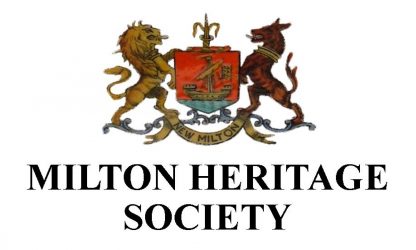Have you noticed the slightly art deco style of the white building in Station Road, next door to Barclays Bank? That is called The Scala Building. It was the site of the first of cinema in New Milton. It may seem hard to believe now but at one time our town had two cinemas.

Milton Heritage Society Collection.
The very first cinema was this one, the Scala Cinema located in Station Road. The building was a wooden ex army hut, possibly from the Barton on Sea army convalescent camp that had closed down at the end of the war. It was purchased by a Mr Wilkinson who in 1920 went into partnership with a Mr Scott to bring films to a New Milton audience. Films were shown from 6.30 every Thursday, Friday and Saturday. They were silent movies with a pianist adding music. This was later done using records.
One young lad, Sydney Barnes, has recorded his memories of those days. He said that the seating was not tiered except for the last three rows, which were also padded. Patrons had to pay extra to sit there. There was a commissionaire at the front of house who wore a magnificent gold braid uniform. He was nicknamed ‘Rudolph Valentino’ who was a silent film star of the era. Also on hand was a large and imposing man who kept order and ejected the unruly customers.
There was usually a crowd of Miltonians waiting for the arrival of the films which were brought to the cinema by van, often with minutes to spare before the advertised opening time. Children (and possibly adults) would be entertained by an opening cartoon, such as Felix the Cat. This was followed by the Pathé News, then at last the film. The picture was projected from behind the screen which was very unusual. It was not unknown for the projectionist to put the film in the wrong way round so the captions appeared on screen, back to front.
The films shown would have included those by Charlie Chaplin such as the A Woman of Paris (1923), The Gold Rush (1925), and The Circus (1928). There would also have been shown The Ten Commandments by Cecil B DeMille which made $3,400,000 in 1923. There were some risqué films shown at the Scala including films such as She and The Queen of Sheba, both of which starred American actress Betty Blythe. Betty was famous in the 1920s for wearing rather skimpy outfits in her films.

Milton Heritage Society Collection.
By the late 1920s films with sound, ‘talkies’, were gaining in popularity and silent movies were on the way out. In 1929 New Milton’s second cinema, The Waverley, was opened at the southern end of station Road, near to the junction of Barton Court Road. The Scala soldiered on. It was used for the Sunday church services when St Mary Magdalene church was being renovated and enlarged. It housed a cafe and confectionary shop. Finally in 1934 it closed its doors for the last time and in May of that year it was demolished. It was replaced with Scala Buildings which are still used today for various businesses.

Milton Heritage Society Collection.
The Waverley Cinema opened its doors for the first time on Tuesday 5th of November 1929. It was built and owned by a Mr Hayward. He lived with his wife at 95 Station Road, next door to the cinema. The first films shown were Number Please starring Harold Lloyd. The following film was Love which featured the famous actress Greta Garbo. The Waverley played a key part in the upbringing of many Miltonians. Memories were made there. During war time films were shown frequently to help raise morale. As with the Scala it was also where people watched the news in a way we take for granted today with television, and the internet. Children would also have loved the confectionery shop that was located beside the Waverley.

Milton Heritage Society Collection.
The Hayward’s sold the cinema to Mr Jack Plank and his wife. On Saturday mornings there was a film show for children, which was extremely popular with large crowds waiting outside for the doors to open. If the film broke down the children would make their annoyance known by throwing sweets, marbles or whatever was available at the screen. Mr Plank would shout for silence, and reprimand the audience threatening to close the show if their behaviour did not improve.
Milton Heritage Society Collection.
Mr Plank closed down the sweet shop and opened his travel centre as seen in the colour photograph above. This was an innovative move as from the 1960s people had a little more disposable income and holidays were a real option.

Courtesy of New Milton Advertiser and Times.
The last film shown at the Waverley was The Magnificent Men in their Flying Machines which was shown on Sunday 17th of September 1972. The cinema was demolished in 1973 and McCarthy and Stone built Waverley House which is sheltered housing for the elderly.


